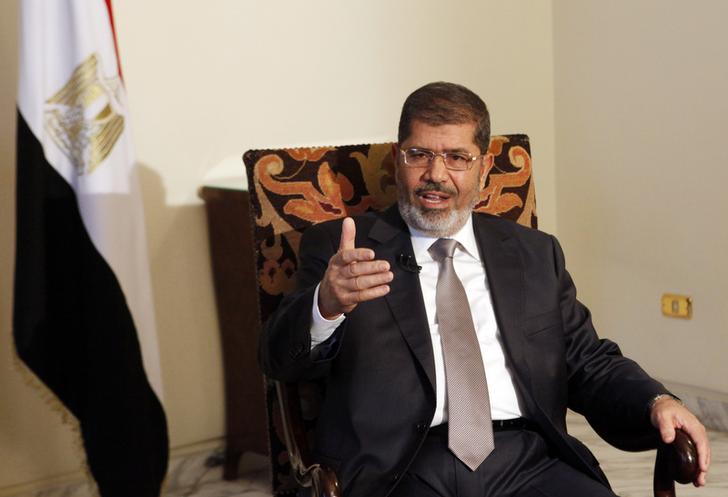Latest NEWS
- Aswat Masriya, the last word
- Roundup of Egypt's press headlines on March 15, 2017
- Roundup of Egypt's press headlines on March 14, 2017
- Former Egyptian President Hosni Mubarak to be released: lawyer
- Roundup of Egypt's press headlines on March 13, 2017
- Egypt's capital set to grow by half a million in 2017
- Egypt's wheat reserves to double with start of harvest -supply min
- Roundup of Egypt's press headlines on March 12, 2017
Egypt's Mursi sends Islamic bond law to clerics - TV

Egyptian President Mohamed Mursi talks during an interview with Reuters at the Presidential palace in Cairo, August 27, 2012. REUTERS/Asmaa Waguih
Egyptian President Mohamed Mursi referred a law allowing the state to issue Islamic bonds to a panel of top Muslim scholars on Sunday, state media said, a step that could complicate the government's plans to pass the legislation.
The parliament led by the Muslim Brotherhood's Freedom and Justice Party approved the law earlier this month and referred it to Mursi, triggering a protest last week by Al-Azhar, the country's leading Islamic authority.
Al-Azhar said its top scholars should have been consulted, as stated in the new, Islamist-tinged constitution passed.
The constitution says that Al-Azhar's Senior Scholars Authority must be consulted on all issues pertaining to the sharia, or Islamic law.
The Salafi Nour Party has been lobbying for the law to be sent to Al-Azhar, in line with the constitution.
The legislation will allow Egypt for the first time to issue Islamic bonds, or sukuk, which adhere to Islamic principles that forbid the payment of interest.
In a statement last week, Al-Azhar criticised the draft law, saying it empowered the prime minister to form the body entrusted with issuing the Islamic bonds.
The Nour Party believes Al-Azhar must also sign off on a deal Egypt is seeking with the IMF because it includes a $4.8 billion loan on which Egypt will pay interest.
Al-Azhar's role in affairs of state is embedded in Article Four of the new constitution. This does not say whether Al-Azhar's view is binding on the government, nor does it make clear the scope of Al-Azhar's role - ambiguity which critics say will cause future political and legal conflict. (Reporting by Ahmed Tolba; Writing by Tom Perry; Editing by Jon Hemming)










